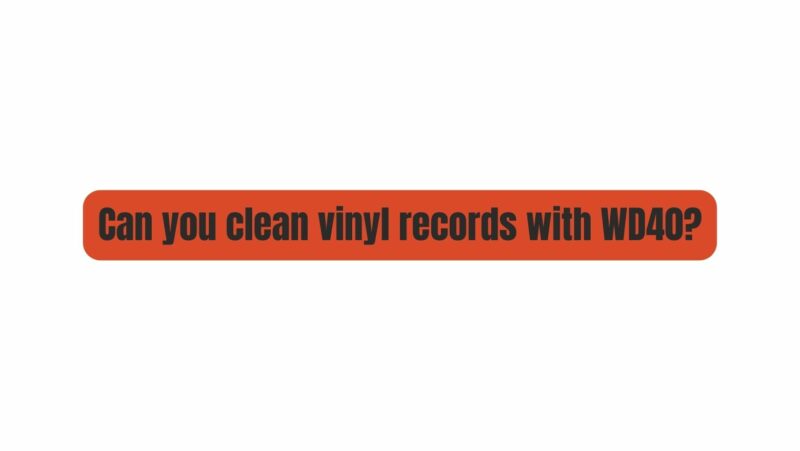Vinyl records hold a special place in the hearts of audiophiles and music enthusiasts. The analog warmth and nostalgia they bring to music listening are unparalleled. However, maintaining vinyl records is crucial to ensure their longevity and pristine audio quality. In recent years, a controversial method of cleaning vinyl records has emerged – using WD-40. This article delves into the intricacies of vinyl record care, examines the validity of using WD-40 as a cleaning agent, and provides safer and more effective alternatives to keep your vinyl collection in top-notch condition.
The Art of Vinyl Record Care
Vinyl records are delicate artifacts of music history. Comprising a vinyl compound, records can be prone to collecting dust, dirt, and other contaminants, which, if left unattended, can degrade sound quality and cause irreversible damage. Proper care is essential to preserve these audio treasures.
Cleaning Vinyl Records: A Necessity
Cleaning vinyl records is not merely an option; it is a necessity. Accumulated debris can cause surface noise, distortion, and even damage the stylus on your turntable. Traditional methods of cleaning include using a soft brush, microfiber cloth, or specialized cleaning solutions. But as vinyl enthusiasts seek innovative solutions, the idea of using WD-40 has gained traction.
Debunking the WD-40 Myth
WD-40 is a versatile lubricant and household product known for its ability to displace moisture, remove rust, and loosen stubborn bolts. However, its application on vinyl records is a subject of controversy among collectors. Here, we explore the reasons why using WD-40 is not advisable for vinyl record cleaning.
1. Residue and Damage
One of the primary concerns with using WD-40 on vinyl records is the residue it leaves behind. WD-40 is formulated with various chemicals, some of which can be harmful to vinyl. Applying it to your records may leave an oily film or residue that can attract more dirt and dust, exacerbating the very problem you’re trying to solve. This residue can also infiltrate the grooves of the record, affecting sound quality and potentially damaging your stylus over time.
2. Chemical Reactions
Vinyl records are sensitive to chemical reactions. WD-40 contains volatile compounds that can interact with the vinyl compound, leading to vinyl degradation and deterioration. These chemical reactions can manifest as audible pops, clicks, and even grove damage, diminishing the record’s audio quality and value.
3. Stylus Damage
The delicate stylus of your turntable is in constant contact with the vinyl record’s surface. Using WD-40 as a cleaning agent can lead to premature wear and tear on the stylus due to the abrasive nature of the residue it leaves behind. Over time, this can result in stylus replacement or even turntable damage, costing you more in the long run.
4. Risk to Album Artwork
Vinyl records often feature intricate and valuable album artwork on their covers. WD-40 overspray or accidental application can damage this artwork, compromising the overall aesthetic and collectibility of the record.
Safe and Effective Vinyl Record Cleaning Alternatives
While WD-40 may not be suitable for cleaning vinyl records, there are several safe and effective alternatives that vinyl enthusiasts can rely on to maintain their collections. Here are some recommended methods:
1. Anti-Static Brush
Invest in a high-quality anti-static brush designed specifically for vinyl records. These brushes effectively remove dust and debris from the record’s surface and help minimize static electricity buildup.
2. Microfiber Cloth
A clean, lint-free microfiber cloth is an excellent tool for gently wiping down vinyl records. Always wipe in a circular motion, following the grooves, to avoid causing damage.
3. Vinyl Record Cleaning Solutions
Several commercially available vinyl record cleaning solutions are formulated to safely and effectively clean records. These solutions are designed to remove contaminants while preserving the vinyl’s integrity.
4. Record Cleaning Machines
For serious collectors, record cleaning machines provide a thorough and efficient cleaning process. These machines use a combination of brushes and cleaning solutions to clean both sides of the record simultaneously.
5. Ultrasonic Record Cleaners
Ultrasonic record cleaners use ultrasonic waves to clean deep within the grooves of a vinyl record, removing even the most stubborn contaminants. They are considered one of the most effective methods for cleaning vinyl records, although they can be pricey.
Conclusion
In the world of vinyl record care, there is no room for shortcuts or risky experiments. While the idea of using WD-40 may have piqued the curiosity of some collectors, the potential risks to your cherished vinyl records outweigh any perceived benefits. Instead, opt for safe and proven methods of cleaning and maintenance to ensure your records stand the test of time.
Vinyl records are not only about the music they contain but also the history, nostalgia, and memories they represent. By adhering to best practices and using appropriate cleaning methods, you can continue to enjoy the rich, analog sound and timeless appeal of vinyl records for generations to come. Preserve the magic of your vinyl collection, and let the music spin on, free from the unwanted effects of WD-40 or other harmful cleaning agents.


